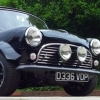
Poor Man's Brake Caliper Overhaul
#1

Posted 01 December 2011 - 05:51 PM
I've just taken my brake calipers off after problems with sticking brakes. I've stripped them of their seals, and removed the pistons, cleaning everything as I go. The pistons themselves were covered in degraded rubber, and a very small amount of pitting on the part that is frequently exposed to the elements. I have bought new seals and brake lines for the rebuild.
Question is; can I reuse these pistons? The pitted area is minute, and has smoothed off to touch, but I can still see it. Is this deep-set corrosion that is likely to come back and foul up my seals?
Ps. Does anyone know the correct torque for the bolts that hold the caliper together? I accidentally started to undo one when I was working under poor light. Never done brakes before!
Pps. It annoys the crap out of me that you can't buy standard pistons. £45 for a set is rather steep on a student budget.
Thanks.
#2

Posted 01 December 2011 - 06:16 PM
There is no published torque setting for the bolt you've undone because they're never supposed to be taken apart really. Although people have done it so someone may respond with a rough idea
#3

Posted 01 December 2011 - 07:11 PM
#4

Posted 01 December 2011 - 07:24 PM
#5

Posted 01 December 2011 - 07:29 PM
#6

Posted 01 December 2011 - 09:56 PM
Lubricate with rubber grease.
You really should fit new pistons as even stainless steel ones are not expensive and brakes are just so safety-critical.
#7

Posted 01 December 2011 - 10:14 PM
Are these going to be as good as they say they are?... http://www.ebay.co.u...68#ht_836wt_858
#8

Posted 01 December 2011 - 10:47 PM
Edit: Actually, all good. Found a post on the subject on the forum.
Edited by minimissionary, 01 December 2011 - 10:53 PM.
#9

Posted 02 December 2011 - 12:22 AM
Aluminum is a very reactive metal. Anodizing is a thick oxide layer intentionally built up on the part to protect it and give it a hard surface. However, the surface is porous. Some anodized coatings are "filled" after the coloring step to close most of the pores. However, even that can develop pits. Once the corrosion starts on aluminum brake pistons (exposed to brake fluid, road salt, moisture, and heat) the corrosion will progress rapidly. Another attribute of aluminum is that it is highly conductive of both heat and electricity. Therefore, it will carry heat into the brake caliper (and fluid) better than a plated steel piston or a stainless piston.
For safety and long life, try and find a good price on the stainless pistons. If you plan on keeping your car for a while they will certainly be a good investment.
#10

Posted 02 December 2011 - 12:23 AM
#11

Posted 02 December 2011 - 02:44 PM
Thanks for the help, all.
#12

Posted 02 December 2011 - 05:34 PM
#13

Posted 02 December 2011 - 05:52 PM
#14

Posted 02 December 2011 - 05:59 PM
#15

Posted 02 December 2011 - 07:21 PM
1 user(s) are reading this topic
0 members, 1 guests, 0 anonymous users


















